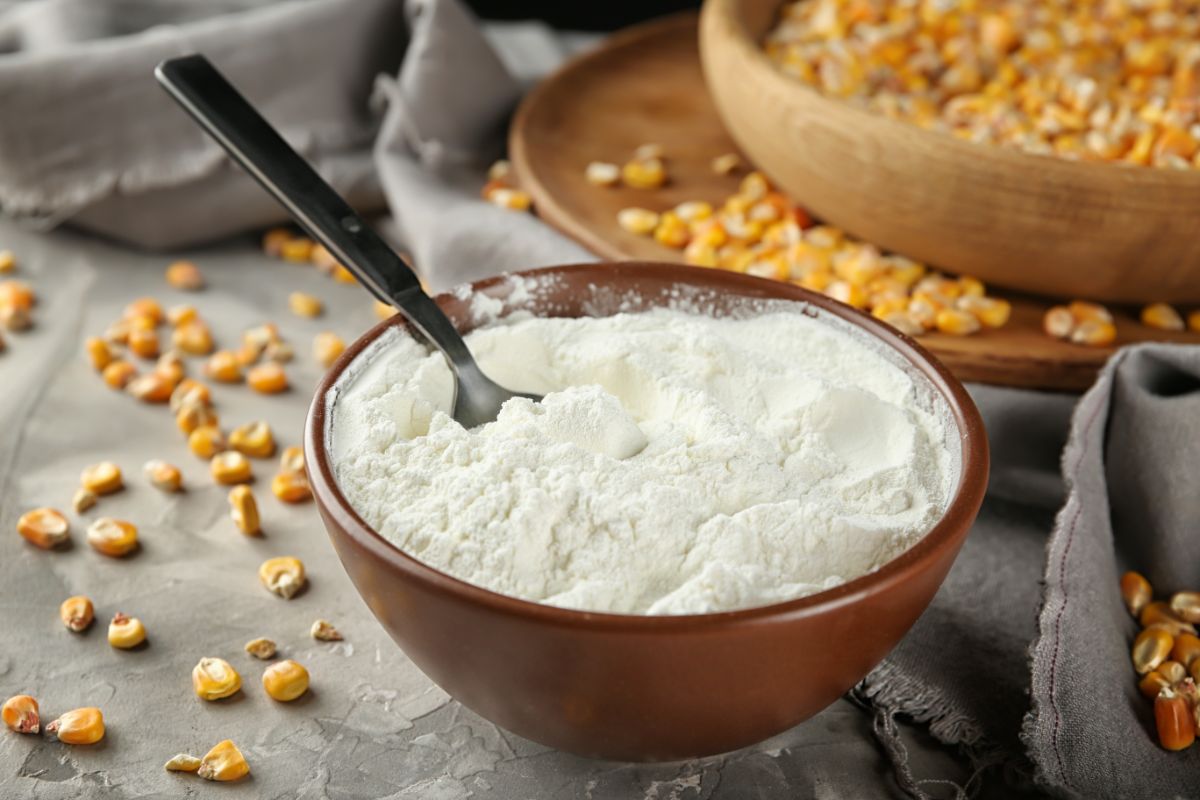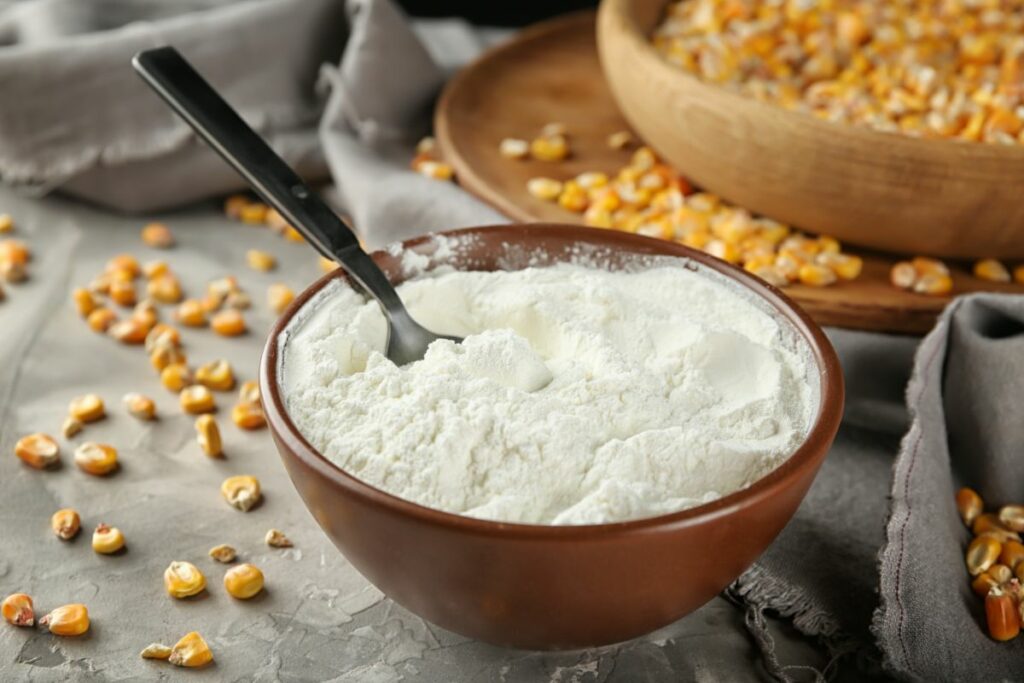When you think about cornstarch, you can probably think of a few different ways to use it in cooking.

You might have used it as a useful substitute for baby powder, or you could have included it as a thickening component in your gluten-free baking recipes.
Nevertheless, you might be wondering to yourself, “Is cornstarch bad for you?” or “can I eat cornstarch on a keto diet?”.
In this article we will answer this question and much more, so keep reading to learn all about cornstarch.
Cornstarch – What Is It?
The milling of the endosperm found in corn kernels results in the production of cornstarch, which is a fine white powder.
The part of the kernel known as the endosperm contains all of the starch in the kernel.
The discovery of this starch was made in 1840 in Jersey City, New Jersey, at a wheat starch business.
It wasn’t until 1851 that it was first used in the process of producing food; before that year, it was exclusively utilized for industrial purposes.
Cornstarch is a fine powder that may be utilized in several applications; however, it does not provide any major nutritional benefit and should not be consumed regularly.
It is completely devoid of most things, such as protein, healthy fats, vitamins, and minerals.
Cornstarch is the ingredient that is most frequently utilized in the kitchen for thickening sauces, custards, stews, and soups.
Cornstarch is liked by some people over wheat flour owing to the former’s clear look and lack of flavor; nevertheless, the latter’s high carb count is an essential factor that must be taken into consideration when cooking with this ingredient.
Is Cornstarch Keto Friendly?
The carbohydrate component of cornstarch is responsible for the majority of the food’s caloric value, with the protein and fat components contributing just a small part of those calories.
Cornstarch includes around 106 calories, 25.6 grams of carbs, 25.3 grams of net carbohydrates, less than one gram of fiber, and less than one gram of protein in a serving size that is one ounce.
Because each serving of cornstarch includes 25 grams of carbs, it is not appropriate for intake if one is adhering to the ketogenic diet.
People who may benefit from consuming more calories can choose cornstarch, even though it does not have a particularly high concentration of vitamins or minerals (i.e., if they struggle to reach the 2,000-calories-per-day recommendation).
On the other hand, the benefits end there in terms of their favorable impact on an individual’s health.
Cornstarch is devoid of all essential vitamins, including vitamins A, C, and D, as well as vitamins B12 and B6, and all amino acids.
When Should You Eat Cornstarch?
You may be thinking that because cornstarch comes from a crop that was farmed would make you assume that it is good for your health; nevertheless, this is not the case at all.
If you are purposefully trying to gain weight, then taking cornstarch could be helpful to your health.
However, this is the only scenario in which this might be the case.
Consuming cornstarch is an easy way to add more calories to your diet and elevate your insulin levels because it has a low flavor intensity but a high-calorie count.
On the other hand, the majority of individuals shouldn’t consume excessive amounts of this thickening agent because of the potential health risks involved.

Even though you shouldn’t use this component if you’re following a low-carb or conventional ketogenic diet, you still need to be careful about how much of it you take in if you’re following a tailored ketogenic diet.
This is because tailored ketogenic diets tend to be higher in fat and protein than conventional.
Even a tiny amount of cornstarch may still drive you out of ketosis because a serving size of a quarter cup has around 24 grams of net carbs.
Even if you are intending to use carbohydrates as fuel for your workout, this may draw you out of ketosis.
Cornstarch Substitutes
Glucomannan
Glucomannan is a kind of dietary fiber that may be found in the roots of the konjac plant.
It is a tasteless substance that may be added to almost anything without bringing about any obvious alterations to the flavor.
Due to the low-calorie count and high fiber levels that it contains, it’s unsurprising that glucomannan is good for managing appetite and helping to reduce excess weight.
It is a natural prebiotic, which has been linked to benefits in cholesterol levels, digestive function, hormone levels, gut health, a reduction in inflammation, and other functions of the immune system.
If you already struggle with digestive and intestinal issues, such as constipation, eating konjac fiber may help reduce some of those symptoms for you (You might want to check out Is Oatmeal Is Good For Constipation Here).
There is a possibility that it will lower cholesterol levels and help with the treatment of diabetes.
The serving size of one cup of glucomannan powder offers just ten calories, as well as zero grams of carbs, zero grams of protein, zero grams of fat, and five grams of fiber.
The serving size also contains zero grams of carbohydrates.
Almond Flour
You may get the same feel and body with almond flour or almond meal as you would with cornstarch, but without the high carb count or any of the possible adverse effects on your health.
Almond flour has been discovered to contain beneficial amounts of a variety of inerals and vitamins, including calcium, potassium, magnesium, manganese, iron, and vitamin E.
There are a total of 160 calories in a serving size of a quarter cup, as well as 3 grams of fiber, 14 grams of total fat, 6 grams of protein, and 6 grams of carbs.
People who are struggling with diabetes or obesity can benefit from using almond flour, as it has been demonstrated to increase energy levels throughout the day, as well as enhance the health and function of the heart, reduce the chance of cancer cell development, and help those who are diabetic or obese.
Summary
Although it is used in several recipes as a thickening agent, cornstarch is not keto-friendly and should be avoided if you are following a keto diet plan.
There are many alternatives out there to try instead of cornstarch, including the two mentioned above, so you should no probably in adjusting your meals to fit in with your diet plan.








